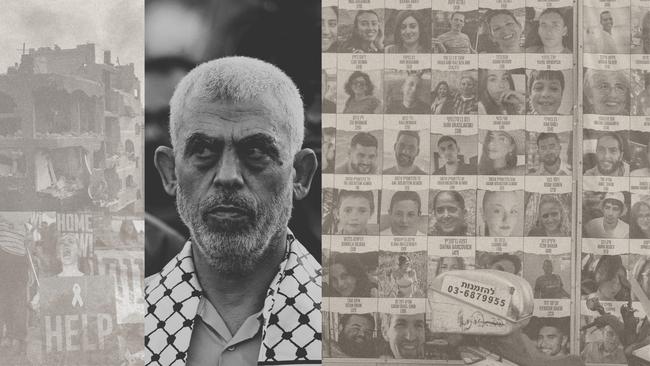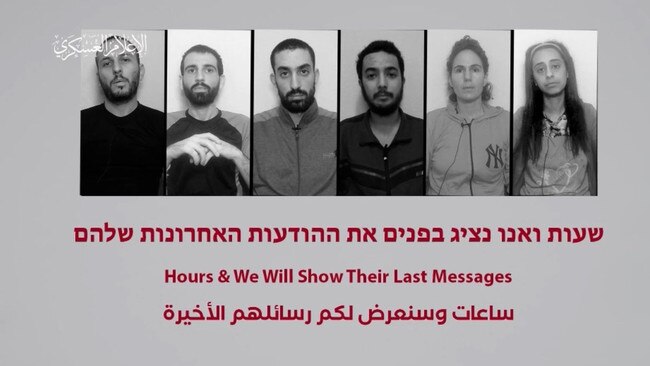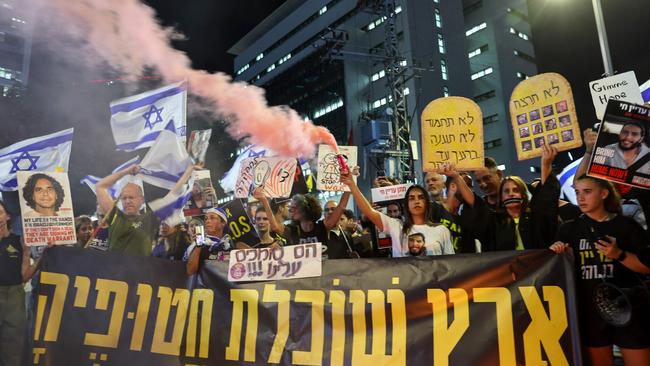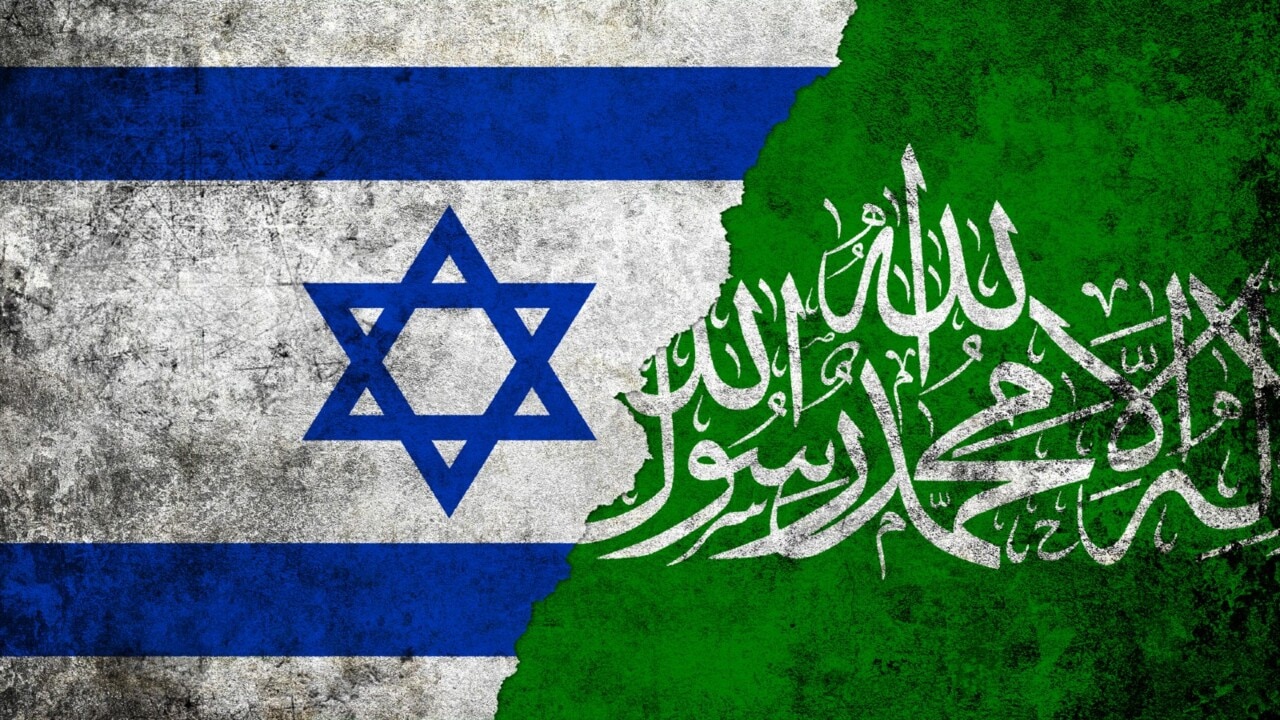Hamas threats to kill hostages could weaken group’s hand in negotiations

The US-designated terrorist group’s threat comes as it tries to negotiate for its own survival after months of punishing warfare and as both sides press demands to end the war in Gaza.
Hamas, after saying for days that Israel had killed the hostages with its bombing campaign in Gaza, issued a new statement on Monday suggesting it had executed them and would kill others if Israel used military force to try to free them. Israel’s rescue missions aren’t expected to end unless there is a deal to release the hostages and end the fighting.
Without a negotiated end to the war, Hamas leader Yahya Sinwar and his fighters won’t be able to leave the tunnels in which they are hiding without risk of being killed by Israel. Instead, they will need to persevere as Israeli forces penetrate more deeply into Hamas’s subterranean lairs.

Hamas’s believed execution of six hostages last week sparked protests and a general strike by Israelis who want their government to agree to a ceasefire and hostage-return deal. But there are also many Israelis who view the killings as another reason the war must go on until Hamas is destroyed.
For Hamas, having fewer living Israeli prisoners also makes it harder to win the release of thousands of Palestinian prisoners held in Israeli jails – something Sinwar has used as a justification for the group’s Oct. 7 attack that killed over 1,200 people, mostly civilians, according to Israel, and included the abduction of more than 240 civilians and soldiers.
Freeing Palestinian prisoners is also important to sustaining the group’s legitimacy after 11 months of war have destroyed most of Gaza and, according to local authorities, resulted in the deaths of more than 40,000 Palestinians. The figure doesn’t distinguish between civilians and combatants.
Of the remaining 97 hostages taken on Oct. 7 to Gaza, 33 of them have been declared dead by Israel. In talks with mediators, Hamas has said it might have no more than 30 living hostages in total, including 12 women, elderly or injured people, Arab mediators said.
Hamas has survived an 11-month-long offensive by a militarily superior foe. But as the Israeli military continues to expand its control, taking over key crossings and borders, dismantling tunnels and killing senior leaders, Hamas’s survival is under growing threat.
“This is an outcome of the chaotic situation that Hamas finds itself in, ” said Kobi Michael, a senior fellow at the Institute for National Security Studies, a security think tank in Tel Aviv, of the threat to execute more hostages. “Hamas cannot operate any more as an organised military.”

Even so, Hamas’s goal in the war is simply survival. If Sinwar and others can achieve a ceasefire and emerge from hiding, they can claim victory and will likely be seen as the leaders of the Palestinian cause. In the absence of a ceasefire, Hamas could drag Israel into a prolonged occupation of Gaza that is likely to sap the strength of its military and prove unpopular among Israelis in the long term. Either way, the war has created a generation of Palestinians who are openly hostile to Israel.
Israel says it has largely ended Hamas’s ability to function as an effective military, although militants continue to fight Israeli soldiers. Hamas says it can no longer communicate within the Gaza Strip, and its leaders in Qatar have largely lost touch with those in the area, Arab officials said.
Israel says Hamas militants have started moving into humanitarian zones, a sign that the group has fewer places to hide. Last week, the Israeli army said it rescued a hostage after his captors had fled.
Israel announces killings of militants nearly daily. On Tuesday, the Israeli military said an airstrike killed eight Hamas members, including one who led an attack on an Israeli community on Oct. 7 when Hamas killed a father in front of his two young boys.
Hamas says it is able to quickly recruit new fighters, but they won’t have the same level of training as the ones who were killed.
“There’s no secret about the fact that Hamas has been weakened,” said Mkhaimar Abusada, associate professor of political science at Al-Azhar University in Gaza and now based in Cairo. “But it hasn’t been weakened to the point that they are going to surrender.” The Israeli military is also taking greater control inside the strip, damaging the influence of Hamas as a civilian administrator.
This week, Israel facilitated the vaccination of thousands of children in Gaza against the polio virus. Gazans also say there is an increased Israeli presence in two major corridors that run across the strip, a reminder of the days before Israel withdrew from Gaza in 2005.
“I never thought we would see Israelis between us again, but here they are, they can come in and out any minute,” said Badr Abu Yousef, a 29-year-old electrician in Gaza City.

Some Arab negotiators said they believe Hamas’s threats reflect growing disarray inside the organisation. Hamas has told negotiators for months that it needed a pause in fighting to track and collect the hostages held by it and other groups.
On Monday, a senior Hamas official, Khalil al-Hayya, said Hamas’s armed wing lost contact with U.S.-Israeli citizen Hersh Goldberg-Polin, one of the six hostages killed, and his guards, after having released a video of him in April.
But then on the same day, the group released a video on its Telegram channel saying it had recorded Goldberg-Polin’s final words.
“These conflicting messages will have great implications on the already complicated talks,” an Arab mediator said. “Israel has always been suspicious of Hamas claims that they did not have information on all the hostages.” In Israel, Netanyahu’s government faces criticism from many Israelis for failing to agree to a deal and for failing to communicate a clear post-war plan for Gaza.
Israeli military officials have said the army has caused enough disruption to Hamas in Gaza, including killing its top two military leaders, and that the group can’t repeat the scale of attacks on Oct. 7.
Netanyahu has insisted that Hamas in Gaza be destroyed, militarily, and that Sinwar be killed.
“Killing Sinwar, of course, would be a huge victory, but it isn’t going to address, ultimately, the security problem inside Gaza,” said Sanam Vakil, a Middle East expert at the U.K.’s Chatham House think tank.
“The failing of Israel’s strategy is that they’re not willing to think about any other solution besides a military one.”
The Israeli military has become frustrated with Netanyahu’s demand in ceasefire negotiations that Israel retain control of the Netzarim and Philadelphi corridors. His critics allege the prime minister’s calculations are political: Far-right members of his coalition have threatened to topple the government if he agrees to end the war. Polls show Netanyahu wouldn’t be re-elected if elections were held now.
But Netanyahu argues that pulling Israeli troops from Philadelphi, which divides Gaza from Egypt, and Netzarim, which cuts across the enclave, would allow Hamas to reconstitute, undermining his war aims.
Political analysts and mediators who talk with Hamas say the group is unlikely to agree to those ceasefire terms, which would see it give up hostages in return for circumstances that hasten the group’s demise.
“There is no doubt that the death of many Israeli prisoners made the card Hamas has weaker,” said Istanbul-based Ibrahim Al-Madhoun, a political analyst close to the group. “But Hamas is not giving up.”
The Wall St Journal




Hamas’s threat to execute more hostages if Israel tries further rescues is a double-edged sword for the Palestinian militant group, which wants to increase pressure on Israeli Prime Minister Benjamin Netanyahu for a ceasefire, but risks costing itself one of its most valuable bargaining chips.